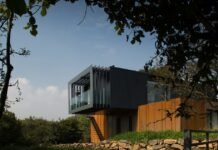In recent discussions across the British Virgin Islands (BVI), the topic of container housing has stirred significant debate, garnering the attention of local authorities, citizens, and media alike. The use of shipping containers as residential structures has become increasingly common, prompting concerns about structural integrity, aesthetic value, and community standards. Renowned radio talk show host and clergyman Pastor Claude Skelton Cline has emerged as a vocal critic of this trend, arguing that permitting container homes could have detrimental effects on the territory’s real estate market and overall housing standards.
The Emergence of Container Homes
Container homes are not a new concept; they have gained popularity worldwide due to their affordability, versatility, and potential for quick construction. In the BVI, however, the increasing use of 40-foot containers for residential purposes raises questions about cultural identity and architectural integrity. In a recent episode of his radio show “Honestly Speaking,” Pastor Skelton Cline expressed his alarm after witnessing a container-based dwelling being erected in his neighborhood. He recalled the Town and Country Planning Department’s confirmation that this structure was indeed classified as a house.
Concern for Housing Stock
One of Pastor Cline’s main points of contention lies in the potential devaluation of property values within the BVI. Historically, the Virgin Islands have prided themselves on their multi-storey and multi-generational homes, which are often integral to a family’s heritage and financial stability. The introduction of container homes, according to Cline, poses a risk to this established housing stock. “What becomes of the housing market in terms of the value of properties?” he questioned. His concerns are heightened by the potential impact that non-traditional structures could have on both aesthetic expectations and community values.
Safety and Environmental Considerations
Beyond financial implications, Pastor Cline raised critical points regarding the safety and sustainability of container housing. The British Virgin Islands are situated in a region prone to natural disasters, including hurricanes and earthquakes. Container homes, while they may provide low-cost housing, lack essential qualities needed to withstand such events. Cline emphasized, “We are living in an earthquake, hurricane zone. How is this in the best interest of the country?” His statement underscores a growing concern regarding the resilience of buildings to natural forces and the need for stringent regulations.
The Call for Stronger Regulations
In light of these concerns, Cline advocates for stronger regulations governing the use of shipping containers as residences. He contends that allowing even a single container home sets a dangerous precedent and might encourage others to follow suit. This could lead to a proliferation of substandard housing that deviates from the established cultural and architectural norms of the Virgin Islands, further diluting the integrity of the community’s real estate landscape.
Cultural Identity and Leadership
The clergyman’s criticisms also extend beyond housing to broader reflections on leadership and cultural identity in the BVI. He lamented the trend of importing older vehicles and right-hand drive cars, questioning, “Where is the leadership? What culture and standards are we trying to maintain?” His remarks resonate with many BVIslanders who have long viewed their homes as extensions of their identity—a tangible representation of continuation and legacy.
Community Response
The community response to container housing is mixed. While some see it as a pragmatic solution to pressing housing shortages, others resonate with Cline’s concerns about community values and aesthetic standards. For many residents in the BVI, their homes provide rental income through long-term leases or short-term stays, such as those promoted by platforms like Airbnb. The fear remains that accepting container construction could threaten the existing rental market and alter the landscape of community economics.
Conclusion
As the discourse around container housing continues in the British Virgin Islands, the stakes are high. The implications extend far beyond individual homes; they reach into the heart of community identity, economic stability, and environmental resilience. Pastor Claude Skelton Cline’s vocal opposition is part of a larger conversation about what the future of housing should look like in the BVI. The challenge remains to find a balance between innovative housing solutions and the preservation of community standards and integrity. As this debate unfolds, stakeholders must consider not just the immediate economic benefits, but also the long-term impacts on the territory’s cultural and architectural heritage.














